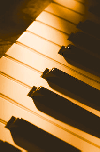The Music of Writing
My grandmother was a piano teacher. Widowed in middle age with four children, she made her living by sharing her love for music with several generations of young folks, me included. The popular book for beginners back then was “Teaching Little Fingers to Play,” which is about an apt a title for any book I can imagine. Thousands of little fingers stumbled across the keys of her Story and Clark upright piano, and many became proficient, a few truly talented. I fell somewhere just shy of the middle.
I wish I had stayed with those piano lessons longer, but at a point in junior high school I got a job and discovered girls, and left the lessons behind. Still, there are things about my hours at the keyboard of that Story and Clark that have stayed with me. I can read music, I understand harmony, I have a good feel for rhythm. The basics.
Music has always been an important part of my life. I sang in the high school glee club and church choir. I became a teenaged disc jockey and worked my way through college spinning records for stations in Tuscaloosa. I came over time to an appreciation for just about any musical genre you can imagine – rock, pop, country, bluegrass, classical, jazz. I retained enough of those basics of composition to write the songs, music and lyrics, for two stage musicals. I hear music in my head, and some of it is new stuff. I know enough to put it in a lead sheet and then turn it over to my music professor friend, Dr. Bill Harbinson, who arranges it into what I call “real music.”
Music informs my storytelling. I figured out early on in my playwriting career – from studying the work of talented people like Rodgers and Hammerstein – that a song in a play should illuminate character, advance the plot, or (hopefully) both. The songs should be an integral and seamless part of the story.
Music and lyrics are woven into my novels. In Old Dogs and Children, Dorsey Bascombe plays the trombone, and he tells his small daughter Bright that “a trombone is the sound of God breathing.” In my new book, The Governor’s Lady, a bluegrass band “makes the air dance with their fiddles and guitars and banjos.” And Pickett Lanier, later to become a governor and presidential candidate, writes and sings a song for his new wife Cooper:
If I was a three-legged dog, two legs front
and one leg rear,
I’d rouse myself in the
evening time, get my three old legs in gear;
Leave my place in the cool,
cool shade, drink my fill of Gatorade,
And hippity-hop to you, my
dear.
It says a lot about Pickett, and not for the better, that he puts aside his guitar and turns to politics.
Music has also given me a sense of the rhythm of a story, especially one played out over the length of a book. To me, a good story has an ebb and flow to it. It can’t go at break-neck speed all the time. It needs moments to pause in the cool, cool shade and ponder. Those are important moments to me in discovering who my characters are and why.
So it started there on the bench of my grandmother’s Story and Clark upright as she patiently taught my little fingers to play. Now, when I write, she’s always at my elbow.
Robert Inman’s previously-published novels – Home Fires Burning, Old Dogs and Children, Dairy Queen Days, and Captain Saturday – are available on Amazon Kindle, Barnes & Noble Nook, and Kobo in e-book format.

